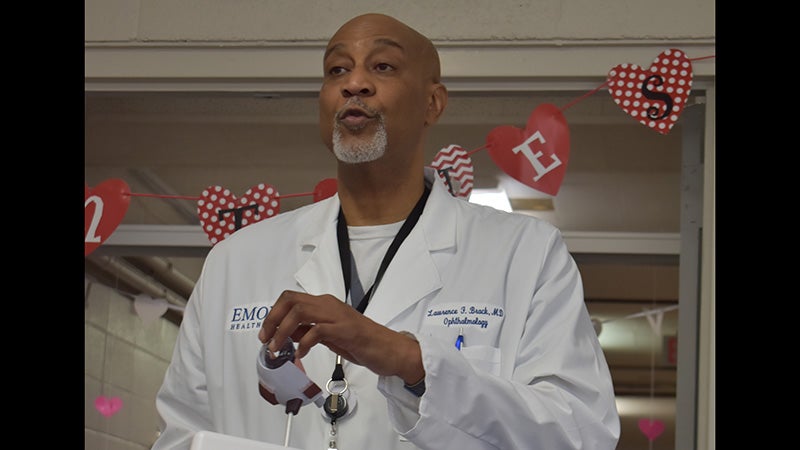Ophthalmologist talks cataracts surgery with Lanett seniors
Published 8:00 am Friday, March 1, 2024
|
Getting your Trinity Audio player ready...
|
LANETT — On Wednesday, a large group of local seniors heard from an expert on the different kinds of problems people can have with their vision as they age.
Dr. Lawrence Brack is an ophthalmologist with the Emory Healthcare Network. He’s been practicing since the year 2000 and is currently with Emory of LaGrange.
He is board-certified in ophthalmology and has received training at the University of Tennessee College of Medicine, Chattanooga; the University of Texas Health Science Center, Houston, and at the Indiana University School of Medicine.
He and fellow Emory of LaGrange colleague Dr. S. Anna Kao are the only ophthalmologists between Columbus and Newnan.
There are different specialties in the field of eye care. Ophthalmologists like Dr. Brack are medical doctors with additional training to specialize in ophthalmology. They are permitted to perform very delicate eye surgery such as cataract removal. Optometrists have at least five years of training in optometry. Their main concern is improving people’s vision by prescribing glasses or contact lenses. They can also treat minor eye conditions such as dry eye or pink eye. An optician is someone who makes glasses. They cannot diagnose or treat eye conditions.
An ophthalmologist, explained Dr. Brack, is someone who specializes in the evaluation and treatment of eye movement problems and binocular vision.
They are trained in getting the eyes to work in sync.
As people age they can have vision problems that result from cataracts, glaucoma or macular degeneration.
Brack said that cataracts occur as one ages because the natural lens in their eye becomes clouded. It’s like trying to look through the windshield of a car that’s foggy or dusty. Things look blurry, hazy or less colorful to someone with cataracts.
The only way to significantly improve this is to remove the lens with surgery and replace it with an artificial one. A person with cataracts does not to have surgery. They should consider it, though, if their vision is keeping them from doing their daily activities.“Cataracts are common,” Brack said. “If you live long enough you will probably have them.”
He added that cataract surgery has made many improvements over the years. “My dad had to spend a few days in the hospital when he had cataract surgery,” he said. “He then had to wear big, thick glasses. You don’t have to do that now, but you may need to glasses or contacts to have a full range of vision. Ninety-nine percent of people see much better after cataract surgery, and it doesn’t take that long. Many women will spend more time in a nail shop getting their nails done than they will in cataract surgery.”
Glaucoma is a disease that damages your optic nerve. It usually happens when fluid builds up on the front part of your eye. The extra fluid increases the pressure on your eye, damaging the optic nerve.
Glaucoma is the leading cause of blindness for those who are at least 60 years old. In most cases this can be avoided with early detection and treatment. Glaucoma can be treated with medicine or surgery.
“Cataracts affect your quality of vision,” Brack said. “Glaucoma affects your quantitative vision. You can have blind spots. It can get to the point where it’s like seeing things through a straw.”
Brack said that anyone with a family history of glaucoma needs to start getting checked for it when they are in their forties.
Age-related macular degeneration (AMD) happens when the part of your retina known as the macula becomes damaged, resulting in the loss of central vision. It becomes hard to make out fine details either up close or far away.
AMD is very common. It’s the leading cause of vision loss for people who are 50 years of age or older.
Those who are at risk for AMD are those who have diets that are high in saturated fat (meat, butter, cheese, etc.), who are overweight, smoke cigarettes, have hypertension and a family history of AMD.
“Macular degeneration is often hereditary,” Brack said. “If it’s in your family you need to get checked for it. Supplements can help you if you start taking them early on.”
While glaucoma is characterized by blind spots, AMD usually starts in the middle of your vision.
“There are two types of AMD, dry and wet,” Brack said. “Some people have abnormal blood vessels. They can grow wild and fragile like weeds. They may need injections when this happens. The blood vessels can be controlled, but its sometimes takes time to do it.”
One way to combat it is by eating green, leafy vegetables like turnip greens, kale and spinach.
Those with AMD can be helped by wearing UV sunglasses. The best precaution is to avoid smoking.
“Some people think that smoking only damages the lungs. They’re wrong,” Brack said. “It can damage your heart and your blood vessels, too.”
Diabetes can affect one’s eyesight. “Diabetes retinopathy affects the back of the eyes,” Brack said. “It happens if diabetes is out of control and your blood vessels bubble or balloon out. If anyone has been diagnosed with diabetes they need to understand how important it is to keep it from getting out of control. It can happen quickly, especially when you age. The more advanced it is the more difficult it is to treat. You can lose a toe, then two, then a foot and then a leg. My biggest goal is for you to get the help you need.”
Brack remained at the senior center for an extended period answering all kinds of questions the seniors had about their vision and potential problems they could have. Senior Center Manager Sandra Thornton said that Brack had treated her. “I can see very clearly now,” she said.





